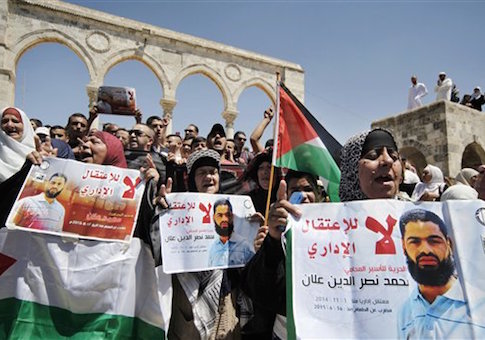JERUSALEM—For the first time in years, rockets fired from across the border struck inside northern Israel Thursday. There were no casualties.
Two rockets hit inside Israel’s Upper Galilee and two on the Golan Heights.
An Israeli security source said the rockets were fired from Syria by Islamic Jihad, "an organization which has the financial back and the direction of Iran."
It was not clear from that statement whether Israel is attributing direct responsibility for the rocketing to Iran.
Islamic Jihad, which is strongly represented in the Gaza Strip, has threatened to fire rockets from there if a Palestinian member of the organization, who has been on a two-month hunger strike, dies. Firing rockets from Syria could be a way of avoiding Israeli retaliation against the Gaza Strip, where the identity and address of many militant activists is known to Israeli intelligence. The hunger striker, Mohammed Allan, is alive in an Israeli hospital, although he was reported to be near death earlier in the week.
The Israeli security source said the target of retribution for Thursday’s rocketing will be Syria, from whose territory, opposite the Golan Heights, the rockets were fired.
"The IDF sees Syria as responsible for the rocket fire and it will bear the consequences of the action," a security source said, according to the Jerusalem Post.
Israeli artillery opened fire on an area near the Syrian town of Kuneitra from which the rockets were reportedly fired. Israeli aircraft also attacked several targets in the area. Further retaliation is expected, Channel Two reported.
Prior to the landing of the rockets in late afternoon, sirens were sounded in several Galilee communities, indicating that the Israeli military was closely monitoring events across the border. For the past year, Hezbollah, with active Iranian input, has been attempting to extend its area of confrontation with Israel from Lebanon, which borders northern Israel, to Syrian territory opposite the Golan Heights.
In an Israeli air strike in January near the Golan, six Iranian military personnel, including a general, and six Hezbollah operatives were killed. The group was apparently reconnoitering the Golan border.
Iran, in an attempt to preserve the regime of President Bashar al-Assad in Syria, has encouraged Hezbollah to play a central role alongside regime forces in the battle against rebels.
The hunger striker, Allan, has refused to eat since June 16 to protest being held in administrative detention without a trial. The Israeli Knesset passed a law last month permitting the force feeding of hunger strikers but the Israeli Medical Association has called on its members not to be party to force feeding, which the association’s president termed "torture."
Anticipating strong Palestinian reaction if Allan dies, Israel this week moved two Iron Dome anti-rocket batteries opposite the Gaza Strip. This morning, Allan’s condition was reported to have improved after he agreed to accept some nourishment. Doctors, however, said his extended fast may have caused brain damage.
That finding created a political way out for Israel, which had been unwilling to give in to demands by Allan’s family and attorney that he be released.
Since he was apparently suffering from brain damage, security officials said, he no longer constituted a potential threat, and his administrative detention was lifted. But he will meanwhile remain in the hospital as a patient, officials said.
